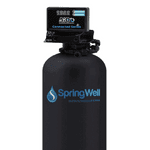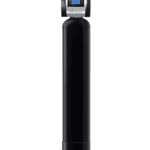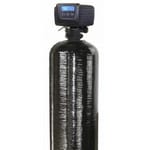An Oxidizing filter won’t rock your world, but it will drastically change how you feel about your water. If your tap is off limits, and you’re spending more on appliance repairs than vacations, iron could be to blame.
Iron can wreck your plumbing, beat up your water heater, and leave your coffee tasting like a mouthful of nickels. Basic carbon filters won’t touch it — you need a system built to take on iron. Here’s what actually works.
Expert Picks:
- Best overall: SpringWell WS
- Best For High Iron: Softpro Iron Master
- Best For Bacteria: Pentair
- Best For Sulfur: Tier 1
- Best Chemical System: Crystal Quest
- Best Budget: Durawater Iron Eater
#1 SpringWell WS System
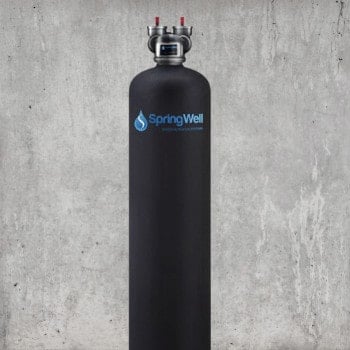
SpringWell is built for well water with high mineral content, sulfur, or manganese. It uses air injection to oxidize contaminants and trap them in a single tank — no chemicals, no hassle.
Say goodbye to orange stains and that rotten egg smell. Your water will look, smell, and taste like it should.
- Whole-home protection against iron
- Maintenance-free
- Environmentally friendly
- Straightforward DIY installation
- Easy bathroom-based sizing
Use Coupon Code: QWL5 to save
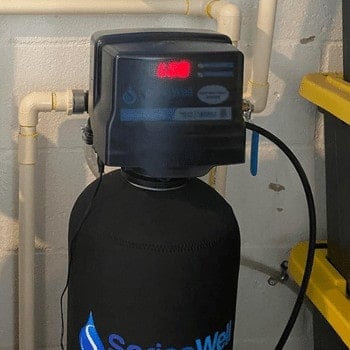
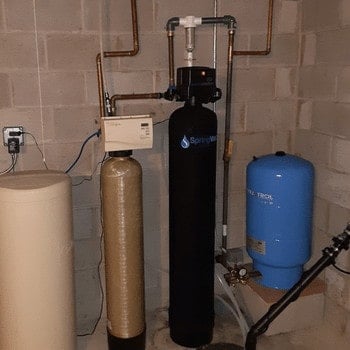
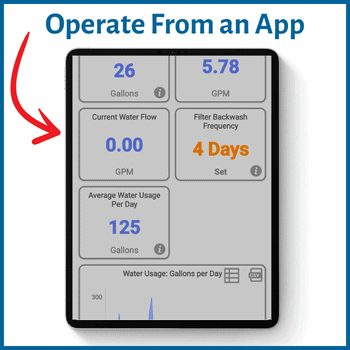
Good Fit For: Homeowners who want a high-performing, low-maintenance solution that quietly handles high levels of iron.
May Not Suit: Those working with a tight budget — the SoftPro AIO system is a more affordable alternative.
Pros
- Runs whisper-quiet — you’ll barely notice it’s there
- Bluetooth control lets you adjust everything from your phone (no guessing)
- Smart backwash cycles save water and extend system life
- Maintains steady flow, even under tough water conditions
- Easy install for DIYers, but straightforward enough for a plumber too
- Automatic backwash keeps things running with minimal effort
- Built to handle moderate iron and sulfur levels — up to 7 PPM iron and 8 PPM— without breaking a sweat.
- Built to last — feels like a long-term solution, not a band-aid
- Backed by a rock-solid lifetime warranty
Cons
- Doesn’t ship with fittings — you’ll need a few extras from the hardware store
- The head is plastic (which is normal), but we’d love to see metal at this price
- Pro tip: Have fittings and thread sealant on hand before install to save time.
What Others Have Said:
“Stuart E said on 4/17/23: We had terrible iron content in the water. This system made an immediate difference in the quality of the water. I would advise not to buy any fittings until your actual unit arrives though. The instructions and video show the spin-down filter being threaded, but mine is not threaded. So I had to return the 1″ NPT nipples I bought and use solvent Read more about review stating Excellent
cement and PVC fittings to connect the spin-down filter to the system. Not a negative on the product, but I should have waited until it arrived to buy parts. I would still recommend this system to anyone with well water.”

SpringWell Product Updates:
- SpringWell now offer filtration for 4+ bathrooms
- Optional UV add-on
- Optional Reverse osmosis upgrade.
#2 SoftPro Iron Master AIO
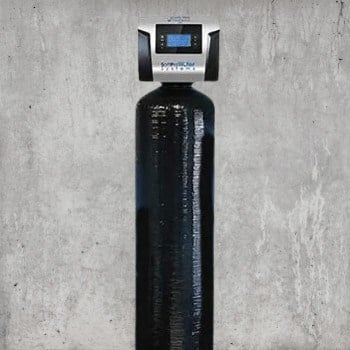
The IronMaster crushes iron without chemicals — removing up to 30 PPM, one of the highest ratings available. It comes in three sizes to match your home’s flow rate, so you can get the right fit without overspending on a system that’s too large.
- Low upfront cost
- Flexible sizing
- Handles the worst iron problems
- Removes hydrogen sulfide and manganese
- Limited lifetime warranty
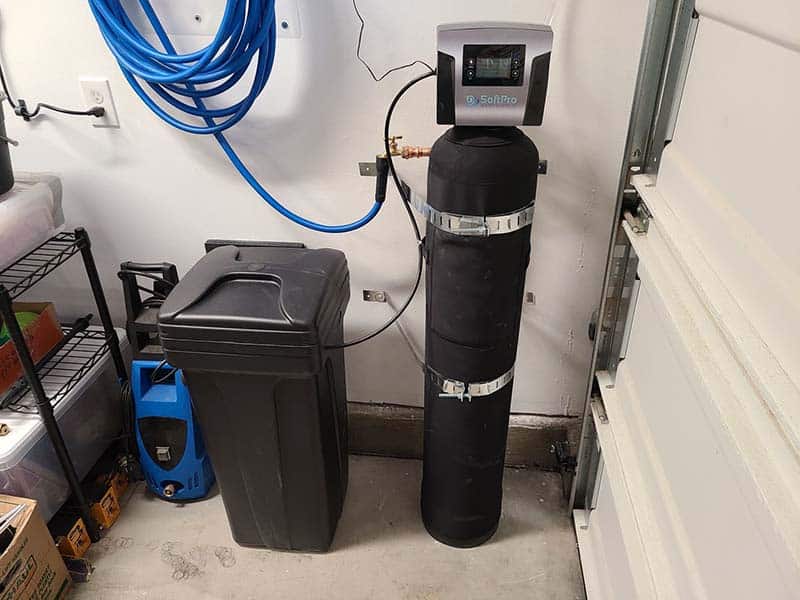
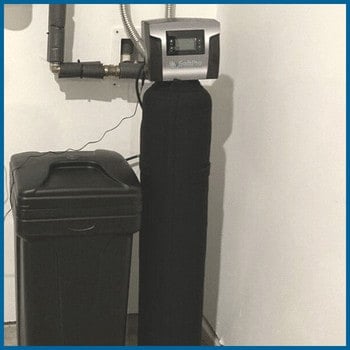
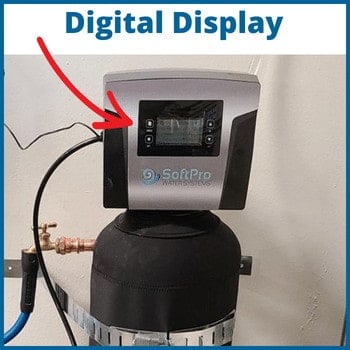
Good Fit For: Homes with very high iron levels that want reliable performance without extra features.
Less Ideal If: Anyone who wants smartphone control or system tracking.
Pros
- The digital control head is straightforward — no mystery menus or codes. Just set it and go.
- It’s assembled in the U.S., and the difference shows. Everything feels solid and built to last.
- This unit punches above its price class. If your iron levels are brutal, it’ll keep pace without breaking down.
- Comes with the essentials — bypass valve and quick-connects — so you’re not scrambling for parts during install.
- Maintains strong pressure even under heavy use — showers and laundry don’t suffer.
- Pro tip: adding a sediment prefilter can reduce the wear on the main media and cut down on long-term maintenance.
Cons
- Requires more maintenance than similar systems.
- The system is not effective at removing all contaminants from your water.
- If your water is highly contaminated with iron, you may need to replace the redox filter media more frequently.
What Others Have Said:
“Evelyn (and Brian) R. said on 10/07/23: If you have high iron and iron bacteria don’t hesitate: BUY THIS ! I know my pictures look a bit messy but that really doesn’t matter to me. This filter is the greatest. It was so easy to put in even in my tiny cramped outdoor pump house. I did it by myself in about an hour if you don’t count the time for pvc glue curing, and I’m a 54 test old woman and an RN not a plumber.
I have both types of iron and iron bacteria in my well water. I had been using big blues with sediment, carbon, KDF filters and it was tolerable but didn’t take care of the iron bacteria. Now my horrible brown iron filled water problem is fixed, and the smell is gone. My water is crystal clear, and I’m so pleased with this product.”
Product Updates:
- Upgraded valve to 1″ to provide more water-flow
#3 Pentair Iron and Manganese
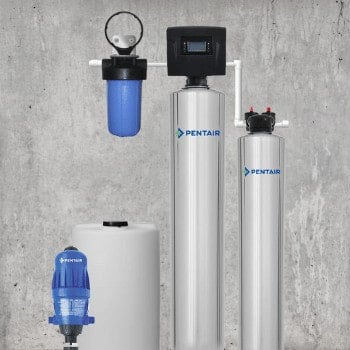
Pentair’s four-stage chlorine injection setup doesn’t just treat iron — it turns problem water into something safe to drink.
It comes complete with a sediment filter that enhances its efficiency, plus a premium block carbon filter that removes chlorine and more. Water is as fresh-tasting as bottled.
- High-capacity
- Safety-certified
- Won’t reduce water pressure
- Durable components
- 60-day satisfaction guarantee
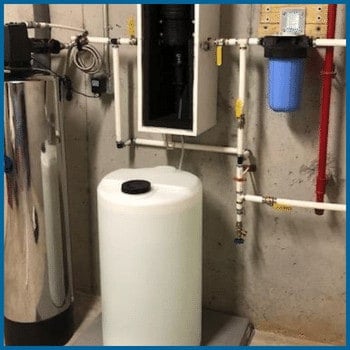
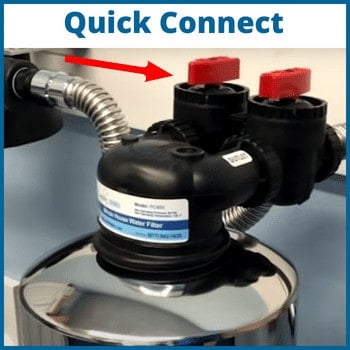
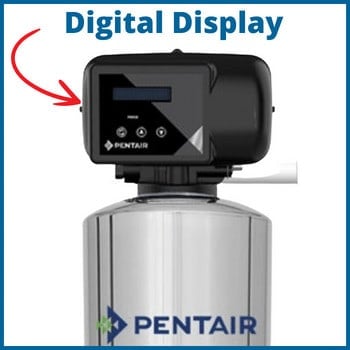
Good Fit For: Homeowners who want cleaner, safer water straight from the tap — especially if iron isn’t the only concern.
Less Ideal If: If you’re trying to stay under budget — this is one of the priciest options on the list.
Pros
- It does more than just remove iron — this system makes your water drinkable again.
- Sediment and carbon stages go beyond iron, scrubbing out chlorine, debris, and leftover taste.
- Third-party certifications (NSF 42, WQA Gold Seal) offer peace of mind — not just marketing fluff.
- The taste difference is noticeable — no hint of chlorine or metallic tang.
- Even with multiple stages, it runs smoothly with little upkeep once installed.
- Chlorine reduction is guaranteed — or they’ll replace the carbon filter at no cost.
- Larger homes aren’t left out — Pentair now offers models for up to 6 bathrooms.
Cons:
- Installation is complex if you’re not handy, and the warranty gives us a headache — each part from tanks to tubing is covered for a different length of time.
Product Updates:
- Pentair now offers the WF10-P for larger homes with up to 6 bathrooms
#4 Tier 1 Whole House Iron Filter
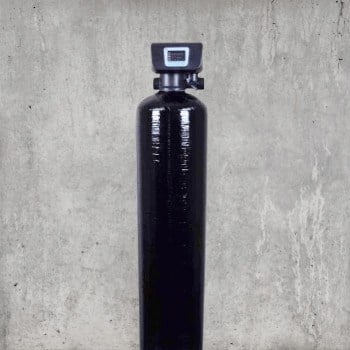
Tier 1’s Precision Series air induction filters reduce up to 30 PPM of iron plus hydrogen sulfide and manganese, ridding your home of unsightly stains and rotten egg smells without chemicals.
From your shower to your kitchen faucet, every gallon is crystal clear.
- Handles the most stubborn iron problems
- Low upfront price
- Space-saving footprint
- Operates quietly
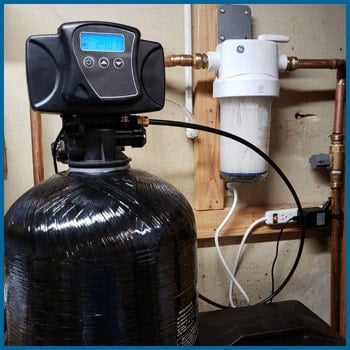
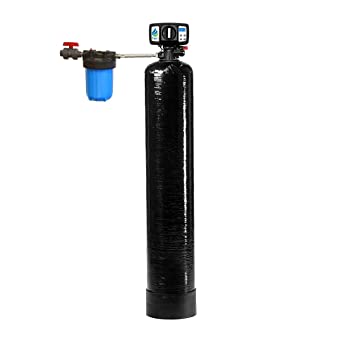

Good for: This is a great system for those looking to save money and eliminate iron.
Not Ideal for: Low pressure systems or homes with tannins.
Pros
- The control head is easy to program — no codes or confusing symbols.
- Tracks water usage and shows gallons until the next cycle.
- Adjustable regeneration and a battery backup for power outages.
- Budget-friendly, lasts up to 5 years with minimal upkeep.
- Includes a sediment prefilter for added protection.
- Helps raise pH by blending in calcium and magnesium — a nice bonus if your water’s acidic.
- Good for small to mid-size homes, though the flow rate is lower than some competitors.
Cons
- Not recommended for water with tannins
- Under heavy use, you may notice a minor drop in water pressure.
Product Updates:
- Now includes an NSF certified electronic head valve
#5 Crystal Quest Whole House Iron Filter
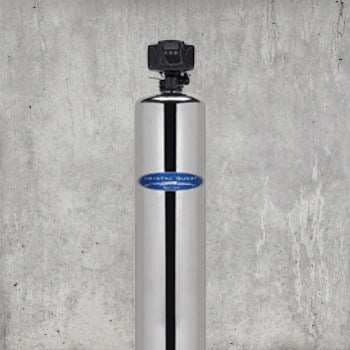
Crystal Quest boast impressive three-stage filtration that removes sediment, agricultural chemicals, industrial solvents, iron, manganese, hydrogen sulfide and more.
Expandable, you can add a softener, UV sterilizer and SMART filter that removes even more toxins, including heavy metals. Choose fiberglass tanks or upgrade to stainless steel.
- Quality filtration
- Won’t reduce water pressure
- Minimal maintenance
- Premium components
- Expandable
Great for: Those looking to eliminate 12PPM of iron from their well water efficiently.
Not Ideal for: Those that want a system that’s more hands-free and less technical to operate.
Pros
- Available in two sizes depending on your water usage, the 9-13 GMP flow rate provides ample water pressure.
- Systems treat up to a million gallons depending on your water quality, but Crystal Quest recommends changing the media every 5-7 years for optimal performance.
- If you have a water problem, Crystal Quest can fix it. Their expandable filtration system removes more contaminants than similar models. But more isn’t better for everyone.
- For homeowners who want a broader level of protection, the specs are impressive. It’s a solid choice for well water with other dangerous contaminants.
Cons
- More complex than standard filters — installation is best left to a pro.
- Not the most user-friendly interface — lots of acronyms and menus.
- Short 1-year warranty feels out of step with the price.
- Pro tip: If you’re not tech-savvy or want simple maintenance, this system might be overkill.
#6 Durawater Air Injection Iron Eater
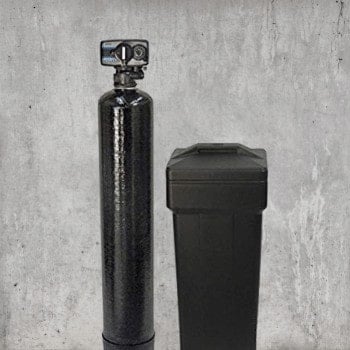
Durawater’s Iron Eater is a no-frills, budget-friendly unit built for well water with moderate to high mineral content. Using air to oxidize and trap iron, sulfur, and manganese, it delivers a compact, chemical-free solution in a single tank.
- Low initial cost
- Chemical-free
- Low-maintenance
- Minimal maintenance
- Outstanding customer service
Great for: Good pick if you want a reliable fix without spending a fortune
Not Ideal for: Not ideal if you need silent operation or smart features — this one sticks to the basics
Pros
- Comes with a Fleck 5600SXT head — widely trusted and easy to set up.
- Change the media every 5-7 years for the best performance — $200 at current prices.
- It removes more hydrogen sulfide than many filters — up to 10 PPM.
- The system schedule is fully programmable. Air injection filters can be loud, so we recommend backwashing when the sound is least likely to be disturbing.
- It comes with a battery backup, so no need to worry if you lose power.
- It won’t win awards for style, but it’s a solid, easy-to-install system that does a capable job cleaning up iron, manganese and sulfur for less.
Cons
- Runs louder than premium systems — especially during backwash.
- No app or smart features — just basic manual programming.
- Pro tip: Schedule backwash cycles for early morning or midday when noise won’t be an issue.
Comparison Table
(Mobile users: Swipe to scroll) Compare Brands & Models
Compare Brands & Models
|
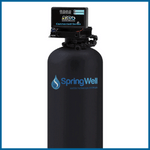 #1 SpringWell WS Filter
#1 SpringWell WS Filter |
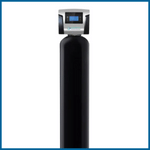 #2 SoftPro Iron Master
#2 SoftPro Iron Master |
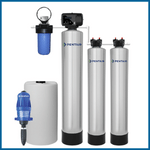 #3 Pentair Iron & Manganese
#3 Pentair Iron & Manganese |
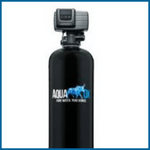 #4 AquaOx FE Edition #4 AquaOx FE Edition |
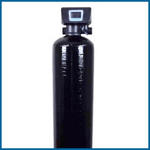 #5 Tier 1 Iron Filter System #5 Tier 1 Iron Filter System |
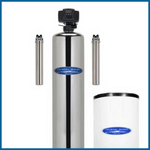 #6 Crystal Quest Filter
#6 Crystal Quest Filter |
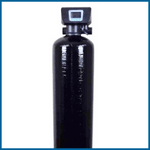 #7 DuraWater Iron Filter
#7 DuraWater Iron Filter |
|---|---|---|---|---|---|---|---|
| Rating | 5/5 | 5/5 | 4.5/5 | 4.5/5 | 4.5/5 | 4.5/5 | 4.5/5 |
| Price | $$$ | $$$ | $$$$ | $$$$ | $$ | $$$ | $$ |
| Iron Type | Ferrous + Ferric | Ferrous + Ferric | Ferrous + Ferric + Bacteria | Ferric | Ferrous + Ferric | Ferrous + Ferric | Ferrous + Ferric |
| Max Fe | 7 PPM | 30 PPM | 10 PPM | 7 PPM | 30 PPM | 12 PPM | 12 PPM |
| Process | AIO + Greensand | AIO + Katalox | Bleach Oxidation + Greensand + Carbon Filter | AIO | AIO | AIO | AIO |
| Flow Rate | 12-20 GPM | 12 GPM | 7 GPM | 6-12 GPM | 6 GPM | 6-12 GPM | 6-12 GPM |
| BlueTooth | ✔️ | ❌ | ❌ | ❌ | ❌ | ❌ | 4.5/5 |
| Warranty | Lifetime | 7 years | 1 year | 10 year | Lifetime limited | 7 years | 10 years |
How We Chose

We’ve been in the water filtration space for over a decade, and we know how overwhelming the options can get. Conflicting claims, techy jargon, and filters that all sound the same — it’s a lot to sort through.
A clear scoring system, built from practical experience, is what we came up with. We weight each factor based on what really matters for homeowners dealing with iron and problem well water.
Our methodology is rooted in seven pivotal criteria, each weighted to reflect its significance:
- Iron Reduction (20%): Focuses on how well a system eliminates both dissolved (ferrous) and visible (ferric) iron.
- Flow Rate (15%): We check if the flow rate can keep up with your home’s water use without slowing pressure.
- Capacity (15%): Measures how much water a system can treat before it needs a media change or replacement.
- Filter Media (15%): We look at what the unit uses — like KDF, greensand, or carbon — and how well it handles iron.
- Installation (10%): Some systems are DIY-ready. Others require a pro. We consider ease and setup flexibility.
- Maintenance (15%): We weigh how often you’ll need to check, clean, or replace parts — and how simple it is.
- Cost Implications (10%): Includes media, energy use, and replacement costs — not just the price tag on day one.
At the end of the day, we’re not just here to point you to a product. We genuinely want you to feel good about your choice, every single time you use that tap. To ensure you’re getting the real deal, we’ve gone the extra mile, diving deep into online reviews and spotlighting any potential hiccups with certain systems. Your trust means the world to us, and we’re here to safeguard it.
Buyer’s guide

Iron isn’t a health hazard, but it’s a homewrecker. It makes water taste bad and wreaks havoc on plumbing, appliances and bathroom fixtures, taking a bite out of your budget with needless repairs.
The straightforward solution is filtration, yet metal contaminants aren’t well understood.
Join us as we discuss the technology, decipher the jargon, and consider their features. Together, we’ll choose the right system for your home.
In this guide, you’ll learn:
- How we selected these units
- What to consider before buying
- Why testing your water matters
- How to match a system to your needs
- What iron is and why it matters
- Answers to common questions
Advantages & Disadvantages

Advantages:
- Filtration systems are incredibly useful for reducing Iron, Manganese and Sulfur in your water supply, eliminating odors, staining and corrosion from plumbing systems.
- We only recommend systems that are easy to install, operate and maintain over the long-term.
- These cost-effective solutions require minimal maintenance and can last up to 10 years with proper care.
- The filter media used is highly efficient at removing contaminants without clogging quickly or needing frequent replacement like other types of filters do.
Disadvantages:
- It’s important to understand what type of metal contaminants you need removed as no filter can eliminate all traces of iron in a perfect world scenario.
- Some models may require additional components such as an air injector system which adds extra costs upfront when purchasing the unit itself as well as ongoing expenses for electricity usage during operation (depending on how often you use it).
- Over time, the filter media used in these systems can become clogged reducing its effectiveness and requiring more frequent replacement .
- Lastly, these systems may not be able to remove other contaminants such as bacteria or viruses from your well water, so additional filtration methods may need to be employed if this is a concern.
Before You Buy

Things to Consider:
1. Test Your Water: Before anything else, determine your water’s iron levels and other contaminants. This will directly influence your choice of filtration system.
2. Budget Wisely: Consider both the initial cost and long-term maintenance. Sometimes, spending a bit more upfront can save you in the long run.
3. Space & Installation: Assess the space you have available for installation. Some systems might be too large for your setup. Decide if you’re comfortable with DIY installation or if you’ll need professional help.
4. Maintenance & Longevity: Check how often parts or media need replacement. A system that requires frequent maintenance might not be the best choice for everyone.
5. Reviews & Warranty: Look at user reviews for real-world insights and ensure the product comes with a solid warranty.
Remember, the right system can make a world of difference. Take the time to research and choose wisely!
Filtration Options
The right filtration system for you depends on the specific metal contaminant in your water and how well it works with your water’s chemistry. It’s important to understand the benefits of these systems, especially if you rely on well water
Let’s narrow them down.
If your water contains only ferric iron — particles that float in your water but don’t turn it brown — a sediment filter may be all you need. Choose from sediment-only filters to multi-stage systems that remove other unwanted contaminants.
If you have iron bacteria in your water, your filtration choices are limited to:
- A chlorine injector
- A catalytic carbon and hydrogen peroxide filter
- An ozone filtration system
For all but the most stubborn iron problems, chlorine injectors are the least expensive to purchase and maintain. Add a carbon post-filter to resolve the chlorine taste.
If the total iron content in your water is less than two ppm, consider:
- A sediment prefilter and water softener
- Any oxidizing filter that works with your water’s chemistry
For total iron content greater than two ppm, choose:
- Any oxidizing filter rated for two ppm or more
Now, consider how these additional factors impact your purchase.
Contaminant Filtration Capability
Oxidizing filters primarily target, well, iron. But iron often brings along some unwelcome pals: manganese and hydrogen sulfide. If you’ve spotted black stains on your bathroom fixtures, that’s manganese at work. And that rotten egg smell? Blame hydrogen sulfide.
While oxidation is the go-to method for tackling hydrogen sulfide and manganese, not all filters handle both. Birm filters, for instance, are the odd ones out. But if you’re dealing with iron bacteria, chlorine filters are your best bet.
And hey, sometimes water tests can throw curveballs with unexpected contaminants. The key? Find a filter (or a combo) that tackles as many issues as possible without breaking the bank. It’s all about getting the most bang for your buck.
Footprint
These filters come in different shapes and sizes. The single-tank ones? They’re tall, almost like your water softener, standing proud at about five feet. You’ll usually find them in basements or garages. But if you’re thinking of squeezing them into a crawlspace, think again.
Opting for a multi-tank system? They demand more space, up to 16 square feet. And trust us, you’ll want some elbow room for maintenance tasks. Always double-check the dimensions before making a purchase.
Flow Rate
Here’s the deal: filtration isn’t instant. Each filter layer the water passes through can slow things down a tad. And a slow flow rate? That’s the culprit behind that frustrating drop in water pressure.
Flow rate, in simple terms, is how much water your filter can handle per minute. In the U.S., households can use a lot of water, especially when multiple appliances are running. So, a top-notch filter should keep pace without making you wait.
System Size
Remember the days when filtration systems had confusing sizing methods? Thankfully, manufacturers have shifted to a more user-friendly approach, sizing based on the number of bathrooms in your home. Just stick to the guidelines, and you’re golden.
Capacity & Filter Life
Capacity is all about endurance: how many gallons your filter can handle before it needs a refresh. It’s crucial to weigh this against the system’s overall cost. A cheap filter that’s high-maintenance? That’s not a deal; it’s a headache.
Installation & Maintenance
Setting up an filtration system isn’t some complex puzzle. With a bit of plumbing knowledge and the right tools, it’s a DIY task. Many sellers even offer guidance through calls or handy online videos. But if DIY isn’t your thing or your home poses unique challenges, getting a professional onboard is a smart move. After all, peace of mind is priceless.
Warranties
Oxidizing filters aren’t cheap, so warranties are a significant selling point. They range from a year to a lifetime, covering repair bills when you can least afford them.
Some companies require professional installation and recommend prefilters, or the warranty is void. And shipping the filter back to the manufacturer for repairs may be on your dime. Know the terms before you buy.
No warranty covers:
- Normal wear and tear
- Improper handling or installation
- Illegal use
- Damage to your home as a result of a malfunction
What Is Iron?
Iron is an element found in the Earth’s crust. Useful in products from frying pans to furnaces, it’s everywhere around you in the rock and soil. Virtually all groundwater has some iron in it. The amount and type determine what kind of iron water filter you need.
How Does Iron Get into Your Water?
Iron seeps into well water from the soil. Every time it rains, water flowing over rock carries iron deep into underground aquifers. The deeper your well, the more iron it’s likely to contain.
Is Iron in Well Water Dangerous for Your Health?

Low levels of iron aren’t considered harmful, but the EPA classifies it as a secondary contaminant because it can harbor iron bacteria — microorganisms that feed on dissolved iron. Alone, they rarely cause illness, but they create conditions under which dangerous bacteria can grow.
How much iron is too much? Levels above three parts per million (PPM) can cause skin irritation. It prevents soap from lathering effectively, creating a sticky residue that clings to hair and clogs pores. The effects range from dryness to oily rashes.
And although it’s not a direct danger, excessive iron affects how water looks, smells and tastes. Drinking less water because you don’t trust what’s coming from your tap is no bargain for your health.
There is one medical condition that iron in water can exacerbate. Called hemochromatosis, it’s an iron build-up in the body caused by a faulty gene. Serious, it affects about a million people in the US, causing heart and liver disease. Talk to your doctor about iron filtration if it runs in your family.
Effects of Iron
The effects of excessive iron are insidious — they’re gradual and cumulative. Unless the water is rusty, the damage is often done by the time homeowners notice. Early treatment is critical.
The consequences of too much iron include:
- Low Water Pressure:
- Iron accumulated in pipes eventually narrows their diameter, so water can’t flow freely. The first symptom is low water pressure. Over time, it prevents the passage of solid waste, causing clogs.
- Damaged Appliances:
- Water-using appliances, from dishwashers to water heaters, rely on adequate water flow. Low pressure forces them to work harder, leading to higher utility bills. Iron slime on delicate parts is corrosive, causing premature breakdowns. Replacing an electric water heater can cost more than $1000!
- Stained Clothing, Dishes and Bathroom Fixtures
- The same red slime that iron bacteria leaves in your pipes also ends up in your washing machine and dishwasher where it leaves hard-to-remove stains on clothing and dinnerware. It coats toilets, tubs and shower walls. Miss a day’s cleaning, and it can permanently discolor grout and tile.
Can Iron Be Removed from Water Naturally?
Filtration is the only reliable way to remove iron, but some filters are chemical-free and use more natural means than others.
How Do they Work?
Oxidation systems are like the superheroes of water purification. They use a mix of techniques to tackle the pesky iron in your water. Here’s a quick breakdown:
- Sediment Filtration
- Think of this as a net catching big rust particles. Great for catching ferric iron, but not so much for its sneaky cousin, ferrous iron, or those pesky iron bacteria.
- Ion Exchange
- This is the same trick water softeners use. Imagine iron sticking to tiny beads as water flows. Sounds great, right? But in real life, it’s a bit picky. It only tackles ferrous iron and needs everything to be just right to work well. If you’ve got tannins in your water, you’ll need an extra filter.
- Oxidation and Filtration
- This method turns ferrous iron into ferric iron and then filters it out. It’s like turning a sneaky ninja into a slow-moving zombie that’s easy to catch. Different filters have their own quirks:
- Birm: Uses oxygen in water. Effective, but needs the right conditions.
- Manganese Greensand: A popular choice that tackles tough iron issues but uses a chemical some folks aren’t fans of.
- Chlorine: Old but gold. It’s been used for ages and also makes water safe to drink. But, it might leave a chemical taste.
- Aeration: Uses air to change ferrous to ferric iron. Eco-friendly but produces more wastewater.
- Catalytic Carbon & Hydrogen Peroxide: A dynamic duo that’s effective but a bit pricey.
- Ozone: Super powerful but comes with a hefty price tag and potential health concerns.
- KDF: Great for showers and multi-stage filters.
- Katalox: A new kid on the block that’s efficient and long-lasting but doesn’t tackle iron bacteria.
- This method turns ferrous iron into ferric iron and then filters it out. It’s like turning a sneaky ninja into a slow-moving zombie that’s easy to catch. Different filters have their own quirks:
Remember, the best filter for you depends on your specific water issues and needs. It’s all about finding the right superhero for your water woes!
Whole-Home Vs Point-of-Use Filters for Iron Removal
There are two types of water filtration systems – whole-house filters that treat water as it enters your home and point-of-use filters that treat water from a single tap.
Point-of-use systems, such as countertop filters or filtration pitchers, can reduce particles of ferric iron in your drinking water, but they can’t remove ferrous iron or iron bacteria, leaving your health, plumbing and appliances at risk. The only practical solution is a whole-house filter.
Was This Page Helpful? Email us: [email protected]
Frequently Asked Questions:

Most water softeners can remove 1-2 ppm of ferrous iron, but ferric iron, tannins, hydrogen sulfide, and a pH above 6.5 impair their efficiency. Unless you need to both soften water and remove low levels of iron, a dedicated system is usually a better option
RO filters can remove iron, but they’re not recommended. Any more than 0.3 ppm will permanently ruin the membrane.
Air injection filters are not only effective, but they’re also chemical-free. Drawbacks include a clicking noise when the injector is working, and they’re not recommended for wells with iron bacteria. The extra oxygen helps it bloom.
Iron Curtain water filters are chemical-free oxidizing filters that remove both iron and hydrogen sulfide. Made by Hellenbrand, they’re sold by better water treatment companies and come in one-, two- and three-tank configurations based on the severity of your iron problem.
Sediment filters remove ferric iron – small but solid particles of rust. They don’t remove dissolved iron or kill iron bacteria.
Rust is ferric iron, so a sediment filter may be all you need. High levels, however, may clog them prematurely. An iron filter may be a better long-term solution.
 116 people found this helpful. Was this guide helpful to you?
116 people found this helpful. Was this guide helpful to you? 
